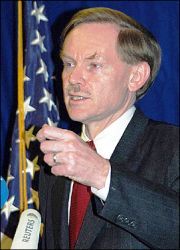US official meets with Sudan rebel leader, urges action on peace accord
By LIZ SIDOTI, Associated Press Writer
RUMBEK, Sudan, Apr 15, 2005 (AP) — A top U.S. diplomat urged the head of Sudan’s southern rebels Friday to take quick action on a peace deal reached with the Khartoum government to end a two-decade-old civil war.

|
|
U.S. Deputy Secretary of State Robert Zoellick addresses a news conference in Khartoum Thursday, April 14, 2005. (AFP). |
Deputy U.S. Secretary of State Robert Zoellick also pressed for peace in Sudan’s troubled Darfur region in his talks with opposition leader John Garang, a day after meeting in the capital with Ali Osman Mohammed Taha, Sudan’s first vice president.
“What we have to do is try to solve the problems — solve both the humanitarian problem and solve the political underlying conditions that led to it,” Zoellick said Friday, arriving in Rumbek to a welcome from several hundred villagers, a marching band and a camouflage unit from the Sudan People’s Liberation Army. One villager held a sign in English reading: “Train us PLA to defeat fundamentalism and terrorism.”
Zoellick was to visit the Abu-Shouk refugee camp outside of El Fasher in the west later Friday before departing Sudan.
Garang and Taha brokered the peace agreement in January. A month later, they called for an immediate end to fighting in Darfur and the resumption of peace talks in hopes of ending the conflict this year.
The number of dead in Darfur since 2003 has grown from 30,000 last summer to 180,000, many of them casualties of disease and famine. Two million people have been displaced.
Zoellick, the No. 2 official in the U.S. State Department, pressed for action during meetings with Taha and other top government officials.
“The responses that I’ve been given are good responses,” Zoellick said, “but this has been a problem that left tens of thousands of people dying so we have to solve the problem.”
In an apparent sign of the government’s willingness do just that, Foreign Minister Mustafa Osman Ismail gave Zoellick an outline of proposals to reach peace.
The United States has looked to Khartoum to curtail attacks by the government-aligned Arab militias that launched a counterinsurgency in 2003 when ethnic Africans rebelled over what they called discrimination by the Arab-dominated government.
Earlier this week, Zoellick pledged US$1.7 billion (A?1.3 billion) in aid for Sudan’s recovery. Then, he warned that peace must be reached in Darfur to ensure future assistance, a strategy intended to force Sudanese leaders to act.
He also called on the Khartoum-based government to stop the Arab militias and hold people accountable for atrocities. It’s unclear just how much influence Taha, the country’s second-in-command, has with the militias.
Known as the Janjaweed, they have committed wide-scale abuses against tribes it says are allied with the rebels. Last fall, then-U.S. Secretary of State Colin Powell said the militias participated in “genocide” — a statement meant in part to pressure the United Nations to address the crisis.
Since then, the United States has refrained from calling it “genocide.” The U.S. State Department says only that it stands by its previous assessment, attempting to avoid a linguistic debate about why the United Nations calls them only “crimes of humanity.”
The U.N. Security Council voted to institute sanctions against anyone attempting to thwart peace and to send 10,700 peacekeepers to Sudan. It also has given prosecutors from the International Criminal Court a list of 51 people to investigate for war crimes.
